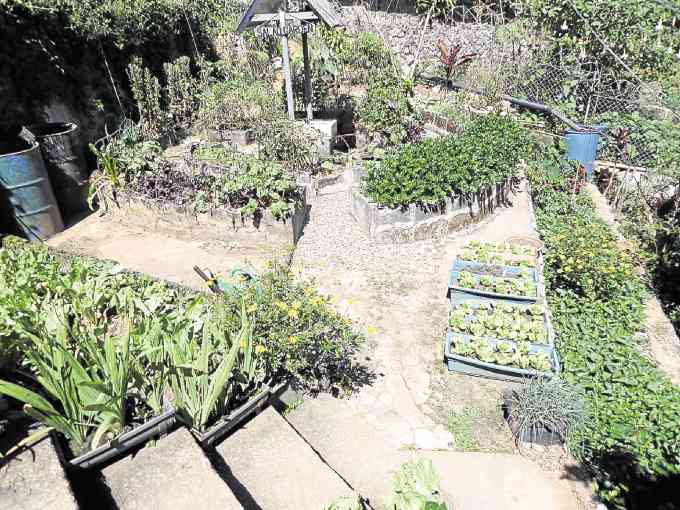In a city surrounded by vegetable gardens that supply much of Metro Manila’s and Luzon’s requirements, it may seem too much trouble for someone to grow the ingredients her restaurant needs.
But that is exactly what Therese Jison, a Negrense who now considers Baguio her home, did.
Knowing that mass production involved the use of chemicals on many commercially grown fresh vegetables, she decided her Mother’s Garden, which she opened in 2010, would use only organic produce.
Jison got into the healthy food business the way many people did.
A mild stroke had her reassessing her lifestyle and habits. Already in the food business, catering to the meal requirements of tourists who used her boats for island hopping and scuba diving, her medical scare prompted her to adopt a more leisurely lifestyle.
“I travel 3-4 months a year and realized that there was a growing awareness for… naturally grown food… Then I met Dr. Jose Balaoing of Benguet State University who tutored me on organic gardening.”
Organic food fanatic
After five or six years, Jison said, “My family started looking healthy and I lost all post-stroke signs. After my mom, who had cancer, passed away, I became an organic food fanatic.”
Jison said when she gained possession of the 2,000-square meter Mother’s Garden property, which belonged to her mother, she immediately planted and transferred the animals and livestock she was raising to Baguio before constructing the restaurant.
“By the time the restaurant opened, I was ready to serve organic food,” she said.
“We serve food mostly coming from our garden and farm. Recipes are based on my 39 years of culinary experience,” Jison, executive chef and proprietor, added.
Fat profit
“Not many people would pay the price for organic. (To be competitive) I am forced to lower the price to the point of (getting only) 5 percent (in profit). But I provide healthy food to my family and my diners, and I keep a small barangay going,” she said.
Jison added, “The fat profit here is that we are eating guaranteed good healthy food. Maybe that’s why it’s (restaurant) still alive, even if it is at the perimeter of Baguio (perched on top of Quezon Hill overlooking much of the city), and not along the tourist row.”
Jison has partnered with Benguet farmer Roy Saguibal and his family who raise free-range chickens for meat and eggs, pigs and cows.
“Roy is now building a new house,” she said.
A bangus producer in Pangasinan provides organic milkfish. Jison has a pond to raise hito (catfish), one of the must-haves on her menu.
She visits all her partners regularly to check on their operations and make sure they keep their end of the bargain. The only things she has to take on faith are imported items.
Jison brings her passion for naturally grown food not just to the gourmet French and Italian dishes she whips up for restaurant patrons.
“We teach organic gardening aside from training the youth to cook, serve and (plant their own) garden,” she said.
Finishing school
With partner Heinrich Maulbecker, retired hotelier and former general manager of the Hyatt and The Manor who is in charge of staff training and development, Mother’s Garden had become what Jison described as a “finishing school” for graduates of hotel and restaurant courses of the Technical Education and Skills Development Authority (Tesda). The trainees, who belong to urban poor families, work for six months in the restaurant and can go wherever they want to go or work for the restaurant.
Jison said she started her organic garden by buying most of her planting material from Europe and America.
Balaoing taught her how to grow heirloom plants (old-time varieties that are open-pollinated not hybrid).
“The next problem was feeding the soil to feed the plants. So we made vermi-composts and teas and mulches to give the plants all the needed nutrients. We also had to have the soil analyzed so we could feed it properly. In organic agriculture, the concentration is on the soil. You have to fatten your soil and detoxify it, so (the quality) of the produce you feed yourself and your family (is guaranteed),” Jison said.
Just as she opted for slow-growing—because chemically-free—ingredients for her food, Jison also encouraged leisurely meals in her restaurant.
She brought antique furniture from the family hacienda in Negros Occidental and the ancestral home in Nueva Ecija to Mother’s Garden to create a charming ambience evocative of the past when time moved so slowly and people did not have to rush.
Patrons are also welcome to move around and see the vegetable plots where their salad comes from or admire the flowers that flourish in the cool climate of Baguio.
A recent major renovation replaced the old fountain with a bigger one so that the sound of water is distinctly heard in the Courtyard dining area. Rose bushes lend their name to the open-air Rose Garden section.
Although Mother’s Garden has a set menu, Jison, who trained at the Culinary Institute of America and Le Cordon Bleu in Paris, said she could prepare special requests from clients provided she was given at least 36 hours notice.
But the menu does change depending on the season.
Mother’s Garden is also available as a venue for events or group activities, like team-building.
Jison said she fell in love with Baguio and Mother’s Garden was her little way of helping project a positive image for the city that had been getting a bad press for problems like uncollected garbage, disease outbreaks, etc., which scared away tourists.
She wanted to show that the Philippines’ Summer Capital had not lost the charm that made it a favorite destination for both local and foreign tourists.
